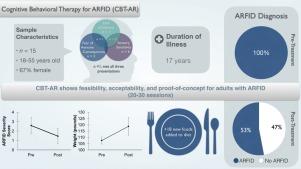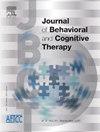Cognitive-behavioral therapy for adults with avoidant/restrictive food intake disorder
Abstract
There are currently no evidence-based treatments for adults with avoidant/restrictive food intake disorder (ARFID). The purpose of this study was to evaluate the acceptability, feasibility, and proof-of-concept of cognitive-behavioral therapy for ARFID (CBT-AR) for adults. Males and females (ages 18–55 years) were offered 20-30 outpatient sessions of CBT-AR delivered by one of five therapists. Of 18 eligible adults offered CBT-AR, 15 chose to participate and 14 completed treatment. All patients endorsed high ratings of treatment credibility and expected improvement after the first session, and 93% of completers provided high ratings of satisfaction at the conclusion of treatment. Therapists rated the majority (80%) of patients as “much improved” or “very much improved.” Based on intent-to-treat analyses, ARFID severity on the Pica, ARFID, and Rumination Disorder Interview (PARDI) showed a large and significant decrease from pre- to post-treatment; and patients incorporated a mean of 18.0 novel foods. The underweight subgroup (n = 4) gained an average of 11.38 pounds, showing a large and significant increase in mean BMI from the underweight to the normal-weight range. At post-treatment, 47% of patients no longer met criteria for ARFID. To our knowledge, this is the first prospective treatment study of ARFID in adults. The findings of this study provide preliminary evidence of feasibility, acceptability, and proof-of-concept of CBT-AR for heterogeneous presentations of ARFID in adults. Randomized controlled trials are needed to confirm these findings. ClinicalTrials.gov Identifier: NCT02963220.


 求助内容:
求助内容: 应助结果提醒方式:
应助结果提醒方式:


